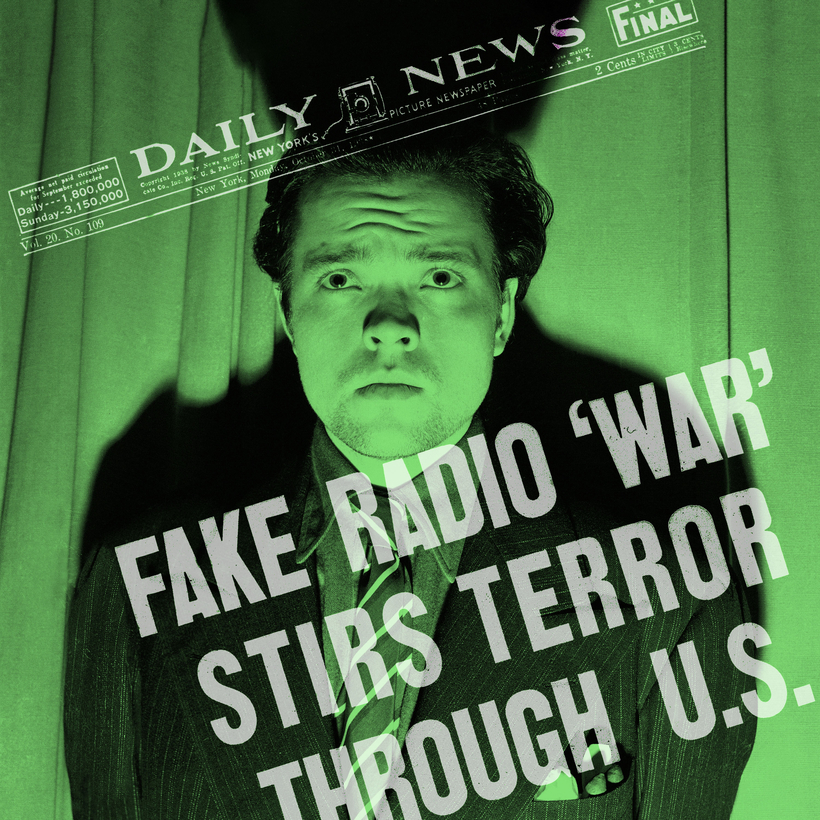To understand the infamous “War of the Worlds” broadcast, masterminded by Orson Welles on October 30, 1938, it helps to know what it was up against. The top-rated competition for Welles’s Mercury Theatre on the Air program was The Chase and Sanborn Show—featuring a superstar ventriloquist. Yes, millions of Americans thrilled to an audio-only version of a vaudeville routine that seems dependent on seeing the dummy being voiced by a ventriloquist.
Suspension of disbelief was apparently not a problem, and in Dead Air: The Night That Orson Welles Terrified America, William Elliott Hazelgrove lists off the chaos that Welles’s Martian-invasion yarn created. People ran pell-mell outside, sped away in cars with no clear destination, went to church, or just phoned the police or radio station to hyperventilate. According to a Princeton Radio Research Project study, six million heard the broadcast, and 1.7 million believed the events were really happening (at a time when more people had radios than plumbing).
It’s been hailed as the greatest hoax of modern times and a cautionary tale about mass media, but Hazelgrove also leans into the boy-wonder legend. Born to a musician and an alcoholic part-time inventor, Welles put on Doctor Faustus at a school for the gifted, bluffed his way into Dublin’s Gate Theatre at 16, and within a few years was voicing both The Shadow and the March of Time news show. Working with John Houseman, he led his Mercury Theatre from one notorious show to the next: Macbeth with an all-Black cast; a production of Cradle Will Rock, which they walked up the street on opening night after budget cuts; a Fascist vision of Julius Caesar, inspired by a Nuremberg-rally picture.
“The War of the Worlds” reached audiences on edge from Hitler’s “annexation” of Sudetenland; many listeners later said they thought the Germans had invaded America. Welles’s broadcast indeed begins slyly: Dance music from the Park Plaza Hotel in New York City keeps getting interrupted by scientific bulletins about Mars. It’s almost 10 minutes before we’re at the crater where the giant Martian capsules have landed in Grovers Mill, New Jersey.

But then it happens: heat rays and flames, two cops die screaming, and our intrepid reporter goes silent—dead, too. Then reports of martial law, military action, and Martian gas attacks, plus a faux secretary of the interior channeling F.D.R.’s voice.
A born master as raconteur and magician, the stentorian Welles had a “demonic authority,” to quote Gate Theatre founder Micheál MacLiammóir. But he also saw the precedent in “Air Raid,” a broadcast that had opened with an announcer speaking from a building in a European border town as war breaks out.
Revamping the H. G. Wells novel, the first-person, live-reported style and constant interruptions enhanced the realism of a radio play that was written in just six days by Howard Koch, who would later win an Academy Award for Casablanca. The actor playing the reporter modeled his delivery on a live broadcast of the fiery Hindenburg disaster, and the sound effects displayed the artistic ingenuity of radio: for the opening of the Martian cylinder, technicians unscrewed an empty pickle jar over a toilet.
Welles was so successful at riling people up that CBS feared legal liability, pushing him into playing contrite for a press conference. Nothing really came of this, and, possibly, people just wanted to forget losing their heads.
The book quotes extensive, nearly undigested passages from newspapers, rubbernecking at their new rival medium of radio, and the Princeton study. A Boston woman saw the flames of the Martian attacks in New Jersey; a Pennsylvania student “felt it was terrible we should die so young.” Canny Miss Delaney in a New York suburb stated: “My plan was to stay in the room and hope that I would not suffocate before the gas [attacks] blew away.”
When not quoting these accounts, Hazelgrove grooves to Welles’s larger-than-life, radio-god lifestyle: gorging on steaks, riding between jobs in an ambulance, shtupping ballerinas. But while recognizing the movie deals that followed “The War of the Worlds”—in Welles’s words, “I didn’t go to jail, I went to Hollywood”—Hazelgrove wrongheadedly downplays the Citizen Kane director’s cinematic accomplishments.
If one portion of this saga deserves a fresh spotlight, it’s Dorothy Thompson, the journalist who knew the score. Writing an editorial entitled “Mr. Welles and Mass Delusion” for the New York Herald Tribune, she praised Welles’s “The War of the Worlds” for showing how easy it was to send “so-called civilized man” stampeding in terror. She concluded “that the danger is not from Mars but from the theatrical demagogue.” Which is to say, the best way today to get into the mind of a Welles listener is to look around.
Nicolas Rapold is a New York–based writer and the former editor at Film Comment magazine

